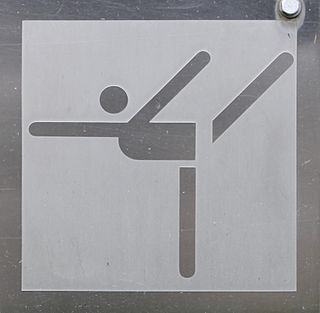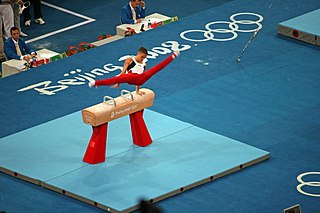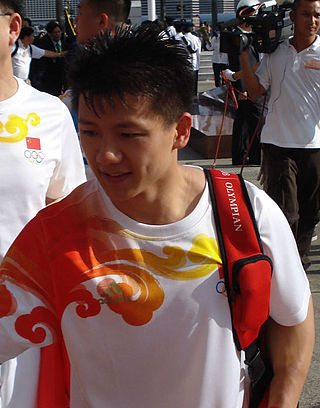
Rhythmic gymnastics is a sport in which gymnasts perform individually or in groups on a floor with an apparatus: hoop, ball, clubs, ribbon and rope. The sport combines elements of gymnastics, dance and calisthenics; gymnasts must be strong, flexible, agile, dexterous and coordinated. Rhythmic gymnastics is governed by the International Gymnastics Federation (FIG), which first recognized it as a sport in 1963. At the international level, rhythmic gymnastics is a women-only sport.

At the 1996 Summer Olympics, two different gymnastics disciplines were contested: artistic gymnastics and rhythmic gymnastics. The artistic gymnastics events were held at the Georgia Dome from July 20–25 and July 28–29. The rhythmic gymnastics events were held at Stegeman Coliseum in nearby Athens, on the campus of the University of Georgia from August 1–4.

At the 1980 Summer Olympics, fourteen different artistic gymnastics events were contested, eight for men and six for women. All events were held at the Sports Palace of the Central Lenin Stadium in Moscow from July 20 through 25th. Several teams who had qualified to compete were absent as a result of the 1980 Summer Olympics boycott, including the United States, Canada, China, Japan, South Korea, and West Germany.
At the 1976 Summer Olympics, fourteen different artistic gymnastics events were contested, eight for men and six for women. All events were held at the Montreal Forum in Montreal from July 18 through 23.

At the 1972 Summer Olympics, fourteen different artistic gymnastics events were contested, eight for men and six for women. All events were held at the Sports Hall in Munich from 27 August through 1 September.
At the 1988 Summer Olympics, two different gymnastics disciplines were contested: artistic gymnastics and rhythmic gymnastics. The artistic gymnastics events were held at the Olympic Gymnastics Hall in Seoul from September 18 through 25th. The rhythmic gymnastics events were held at the same venue from September 28 through 30th.
At the 1992 Summer Olympics, two different gymnastics were contested: artistic gymnastics and rhythmic gymnastics. The artistic gymnastics events were held at the Palau Sant Jordi from July 26 through August 2. The rhythmic gymnastics event were held at the Palau dels Esports de Barcelona from August 6 through 8th.

The men's pommel horse competition at the 2008 Summer Olympics was held on August 17 at the Beijing National Indoor Stadium. The eight competitors with the highest scores in qualifying proceeded to the men's pommel horse finals. There, each gymnast performed again; the scores from the final round determined the final ranking. There were 76 competitors from 27 nations that competed on the pommel horse, with nations in the team event entering up to 5 gymnasts while other nations could enter up to 2. The event was won by Xiao Qin of China, the nation's second consecutive and third overall victory in the pommel horse. The other two medals went to nations that had never earned a medal in the event before: Filip Ude of Croatia took silver while Louis Smith of Great Britain finished with bronze.

The men's rings competition at the 2008 Summer Olympics was held on August 18 at the Beijing National Indoor Stadium. The eight competitors with the highest scores in qualifying proceeded to the men's rings finals. There, each gymnast performed again; the scores from the final round determined final ranking. There were 70 competitors from 25 nations that competed on the rings, with nations in the team event entering up to 5 gymnasts while other nations could enter up to 2. The event was won by Chen Yibing of China, the nation's first victory in the rings since 1984. Yang Wei, also of China, took silver. Bronze went to Oleksandr Vorobiov, the nation's first medal in the event.

The men's parallel bars competition at the 2008 Summer Olympics was held on August 9 and 19 at the Beijing National Indoor Stadium. The eight competitors with the highest scores in qualifying proceeded to the men's parallel bars finals. There, each gymnast performed again; the scores from the final round determined the final ranking. There were 75 competitors from 27 nations that competed on the parallel bars, with nations in the team event entering up to 5 gymnasts while other nations could enter up to 2. The event was won by Li Xiaopeng of China, the first man to win three medals in the parallel bars as well as the first man to win two non-consecutive gold medals in the same apparatus. Yoo Won-Chul of South Korea took silver. Anton Fokin won Uzbekistan's first parallel bars medal in its debut as an independent nation.

The men's horizontal bar competition at the 2008 Summer Olympics was held on 9 and 19 August at the Beijing National Indoor Stadium. The eight competitors with the highest scores in qualifying proceeded to the men's horizontal bar finals. There, each gymnast performed again; the scores from the final round determined final ranking. There were 76 competitors from 27 nations that competed on the horizontal bar, with nations in the team event entering up to 5 gymnasts while other nations could enter up to 2. The event was won by Zou Kai of China, the nation's first victory in the horizontal bar. Jonathan Horton won silver, the United States' second consecutive Games with a silver medalist in the horizontal bar. Germany's Fabian Hambüchen won the first of his three medals in the event with bronze.

The men's artistic individual all-around event was part of the gymnastics programme at the 1924 Summer Olympics. It was one of nine gymnastics events and it was contested for the sixth time. The competition was held from Thursday, 17 July 1924, to Wednesday, 23 July 1924. Seventy-two gymnasts from nine nations competed. Each nation could send up to 8 gymnasts, up from 6 in previous Games. For the first time since 1904, the scores for individual competitors were used to calculate a team score. The men's artistic individual all-around was won by Leon Štukelj of Yugoslavia. Czechoslovakia's Robert Pražák took silver, while Bedřich Šupčík earned bronze. Both nations were making their debut in the event.
The Artistic Gymnastics World Cup is a competition series for artistic gymnastics sanctioned by the Fédération Internationale de Gymnastique (FIG). It is one of the few tournaments in artistic gymnastics officially organized by FIG, as well as the World Championships and the gymnastics competitions at the Olympic Games and the Youth Olympics. Beginning in the 2017-2020 quadrennium, the All-Around and Individual Apparatus World Cup series are used to qualify a maximum of seven spots to the Olympic Games.

The men's parallel bars competition was one of eight events for male competitors in artistic gymnastics at the 1988 Summer Olympics in Seoul. The qualification and final rounds took place on September 18, 20 and 24th at the Olympic Gymnastics Hall. There were 89 competitors from 23 nations, with nations competing in the team event having 6 gymnasts and other nations having up to 3 gymnasts. The event was won by Vladimir Artemov of the Soviet Union, bracketing the 1984 boycott with gold medal wins for the Soviets; Valeri Liukin took silver, as well. Sven Tippelt of East Germany took bronze.

The men's individual all-around competition was one of eight events for male competitors in artistic gymnastics at the 1988 Summer Olympics in Seoul. The qualification and final rounds took place on September 18, 20, and 22nd at the Olympic Gymnastics Hall. There were 89 competitors from 23 nations. Each nation could send a team of 6 gymnasts or up to 3 individual gymnasts. The event was won by Vladimir Artemov of the Soviet Union, the nation's sixth victory in the event. The Soviets swept the medals, with Valeri Liukin taking silver and Dmitri Bilozertchev bronze. It was the third medal sweep in the men's all-around; France had done it in 1900 and Japan in 1972.

The men's rings competition was one of eight events for male competitors in artistic gymnastics at the 1980 Summer Olympics in Moscow. The qualification and final rounds took place on July 20, 22 and 25th at the Luzhniki Palace of Sports. There were 65 competitors from 14 nations, with nations competing in the team event having 6 gymnasts while other nations could have to up to 3 gymnasts. The event was won by Alexander Dityatin of the Soviet Union, the nation's fifth victory in the rings, with fellow Soviet Aleksandr Tkachyov taking silver. It was the second consecutive Games that the Soviet Union had the top two men in the rings. Dityatin, the silver medalist in Montreal 1976, was the seventh man to win multiple medals in the rings. Jiří Tabák earned Czechoslovakia's first medal in the event since 1948.

The men's artistic individual all-around competition at the 2016 Summer Olympics was held on 6 and 10 August 2016 at the HSBC Arena. Kōhei Uchimura won gold, becoming the first male gymnast in 44 years to do this in two successive Olympic Games. Uchimura also became the second man to earn three all-around medals, matching countryman Sawao Kato with two golds and one silver. Uchimura's victory was Japan's sixth in the men's all-around, tying the Soviet Union for most all-time. His margin of victory was only 0.099, which was less than one small step on landing in terms of gymnastic scoring. It was also his eighth consecutive victory at the top competition of the year. Oleg Verniaiev's silver was Ukraine's first medal in the event since 2000. Max Whitlock's bronze was Great Britain's first since the 1908 Games in London.

The men's vault event at the 2020 Summer Olympics was held on 24 July and 2 August 2021 at the Ariake Gymnastics Centre. Unlike the other apparatus events, vault requires gymnasts to perform two exercises in order for results to count towards the vault final; most of the gymnasts perform only one or none. Approximately 20 gymnasts from 15 nations competed two vaults in the qualifying round.

The women's vault event at the 2020 Summer Olympics was held on 25 July and 1 August 2021 at the Ariake Gymnastics Centre. Unlike the other apparatus events, vault requires gymnasts to perform two exercises in order for results to count towards the vault final; most of the gymnasts perform only one or none. Approximately 20 gymnasts from 15 nations competed two vaults in the qualifying round.
The Gymnastics competitions in the 1983 Summer Universiade were held in Edmonton, Canada.












